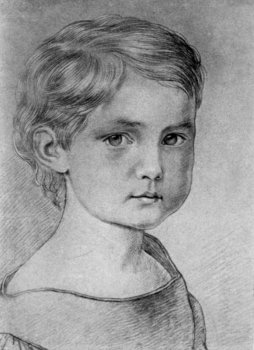MY AUTOBIOGRAPHY
F. Max Müller
Aged 4.
MY
AUTOBIOGRAPHY
A FRAGMENT
BY THE
Rt. Hon. Professor F. MAX MÜLLER, K.M.
WITH PORTRAITS
New York
CHARLES SCRIBNER’S SONS
1901
Copyright, 1901, by
CHARLES SCRIBNER’S SONS
TROW DIRECTORY
PRINTING AND BOOKBINDING COMPANY
NEW YORK
PREFACE[v]
For some years past my father had, in the intervalsof more serious work, occupied his leisuremoments in jotting down reminiscences of his earlylife. In 1898 and 1899 he issued the two volumesof Auld Lang Syne, which contained recollectionsof his friends, but very little about his own life andcareer. In the Introductory Chapter to the Autobiographyhe explains fully the reasons which ledhim, at his advanced age, to undertake the task ofwriting his own Life, and he began, but alas! toolate, to gather together the fragments that he hadwritten at different times. But even during thelast two years of his life, and after the first attackof the illness which finally proved fatal, he wouldnot devote himself entirely to what he consideredmere recreation, as can be seen from such a workas his Six Systems of Indian Philosophy publishedin May, 1889, and from the numerous articleswhich continued to appear up to the very time ofhis death.
During the last weeks of his life, when we allknew that the end could not be far off, the Autobiography[vi]was constantly in his thoughts, and hisgreat desire was to leave as much as possible readyfor publication. Even when he was lying in bedfar too weak to sit up in a chair, he continued towork at the manuscript with me. I would readportions aloud to him, and he would suggest alterationsand dictate additions. I see that we wereactually at work on this up to the 19th of October,and on the 28th he was taken to his well-earnedrest. One of the last letters that I read to him wasa letter from Messrs. Longmans, his lifelong publishers,urging the publication of the fragments ofthe Autobiography that he had then written.
My father’s object in writing his Autobiographywas twofold: firstly, to show what he considered tohave been his mission in life, to lay bare the threadthat connected all his labours; and secondly, toencourage young struggling scholars by letting themsee how it had been possible for one of themselves,without fortune, a stranger in a strange land, toarrive at the position to which he attained, withoutever sacrificing his independence, or abandoning theunprofitable and not very popular subjects to whichhe had determined to devote his life.
Unfortunately the last chapter takes us but littlebeyond the threshold of his career. There isenough, however, to enable us to see how from hisearliest student days his leanings were philosophicaland religious rather than classical; how the studyof Herbart’s philosophy encouraged him in the[vii]work in which he was engaged as a mere student,the Scie
